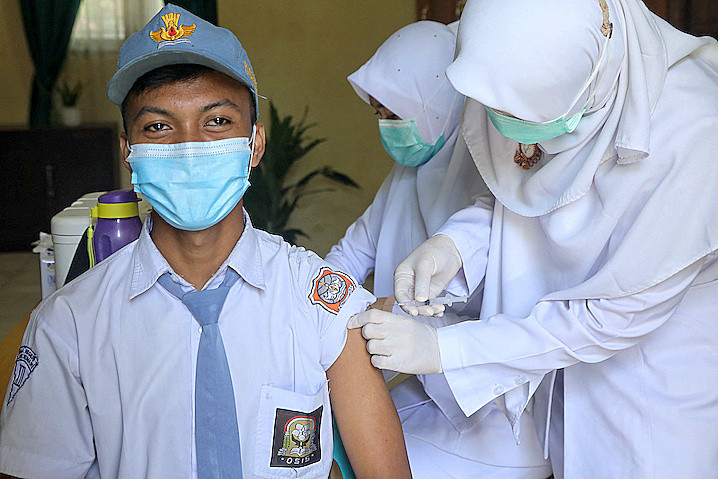Popular Reads
Top Results
Can't find what you're looking for?
View all search resultsPopular Reads
Top Results
Can't find what you're looking for?
View all search resultsVaccine inequity is robbing children of their future
Initially, it was critical to focus on protecting older people, but as COVID-19 threatens further waves of misery across Asia, we must look after young and old in the race to contain this pandemic.
Change text size
Gift Premium Articles
to Anyone
V
accinations are gathering speed in many parts of Asia for adults who can get their hands on doses. Jabs are underway for teenagers in some countries. But this pandemic is having a silent and devastating impact on children.
Millions of young people have witnessed family members die. Children from India to Indonesia and Vietnam are orphaned. Countless others have lived with the fear that this would happen to them. And it still might.
Before the huge waves of Delta variant crashed into Asia in May, a Lancet study revealed that globally, more than 1.5 million children had already experienced the death of a primary caregiver or grandparent who lived in their home.
Imagine what that’s like for a child, living with the trauma of losing your parent to this disease.
This virus does not discriminate. Yet the pandemic is having an unequal impact on people who can’t access vaccines because richer countries have taken the lion’s share. It’s affecting children whose parents can’t afford to stay home so the virus is brought in the front door.
In Asia, total infections and deaths are higher than most could have imagined possible when the disease first broke out. More than 53 million people have been infected according to John Hopkins University’s Coronavirus Resource Center. Many have been hospitalized with serious and long-lasting health effects. Total lives lost from COVID across Asian countries is approaching one million.
These official figures paint part of the picture. Estimates place the likely global death toll at up to four times higher, with the bulk of these cases in under-reported countries of Asia, Africa and the Middle East as reported in a recent study from the Hebrew University and University of Tübingen, published in eLife.
This year in Asia, the Delta variant has driven severe illness and a rising death toll among children and young people. Thousands have died even though early last year many thought that children were safe.
Initially, it was critical to focus on protecting older people, but as COVID-19 threatens further waves of misery across Asia, we must look after young and old in the race to contain this pandemic of a century.
Amid low vaccination rates, this year’s tragic surges across Asian countries left children exposed in crowded homes, while enduring lengthy lockdowns and online schooling.
In Bangladesh, schools have only recently reopened after 18 months of closed classrooms.
Online school is deepening disadvantage and a digital divide already experienced by children living in poverty. This impacts overall health. Most schools in the Philippines, Malaysia and several other Asian countries are still closed. Children are remarkably resilient and can bounce back after disasters. Yet the immense strains on the mental health of young people caused by the pandemic must not be underestimated.
The longer-term mental health impacts will not be clear for some time. It is very concerning that studies across multiple countries indicate increased mental health disorders for children during this pandemic according to a recent British Medical Journal Paper.
The evidence also suggests that children who had prior mental health disorders were at increased risk of pandemic-related mental health trauma.
Young adults have been hit hard by this crisis. We need to focus more on supporting teenagers and youth through to the other side of this pandemic.
Youth may not be leading the death toll but a recent study from the Organisation for Economic Cooperation and Development shows that about 50 per cent of young people have experienced a job-related disruption either personally or from a household member. The study also showed that close to two thirds of youth are worried about their financial security and wellbeing.
The longer-term physical health effects of COVID-19 – known as long COVID – are a growing concern as infections have skyrocketed in young people with countries easing restrictions across Asia. A major analysis published in Nature of 15 studies and nearly 48,000 adult COVID-19 patients who contracted the disease last year found that 80 percent experienced longer term symptoms including fatigue, headache and attention disorder.
Children are not immune. Nearly 10 percent of 2-to-11-year-olds and 13 percent of 12-to-16-year-olds infected with COVID-19 reported continuing symptoms five weeks later, according to a British Office for National Statistics study.
Vaccinations appear to be offering millions of people in Asia a bright light at the end of this long, dark COVID-19 tunnel. But some countries are still languishing behind because they just can’t get enough doses, and this is placing more children in peril.
Indonesia and Vietnam still have less than 25 percent fully vaccinated whereas Bangladesh has 12 percent and Myanmar 7 percent who have received the two jabs according to Oxford University’s Our World in Data.
Richer countries have purchased enough doses to vaccinate their populations, and many are now giving booster jabs, which means that thousands more people in Asia are at risk of dying due to a lack of access to the vaccine. Children are suffering in this pandemic and we are only just starting to realize how much.
***
The writer is Asia Pacific emergency health coordinator, International Federation of Red Cross and Red Crescent Societies.










